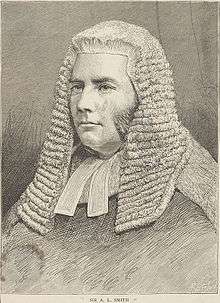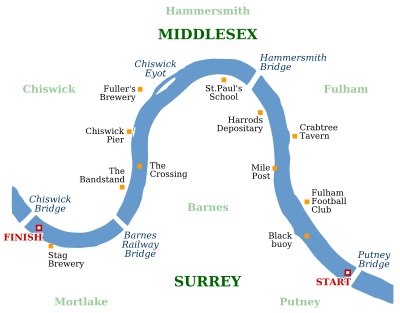The Boat Race 1858
The 15th Boat Race took place on the River Thames on 27 March 1858. Typically held annually, the event is a side-by-side rowing race between crews from the Universities of Oxford and Cambridge. The 1858 race, disrupted by poor rowing and a collision with a barge, was won by Cambridge, who defeated Oxford by 7 1⁄2 lengths in a time of 21 minutes 23 seconds.
| 15th Boat Race | |||
|---|---|---|---|
| Date | 27 March 1858 | ||
| Winner | Cambridge | ||
| Margin of victory | 7 1⁄2 lengths | ||
| Winning time | 21 minutes 23 seconds | ||
| Overall record (Cambridge–Oxford) | 9–6 | ||
| Umpire | Joseph William Chitty (Oxford) | ||
| |||
Background
The Boat Race is a side-by-side rowing competition between the University of Oxford (sometimes referred to as the "Dark Blues")[1] and the University of Cambridge (sometimes referred to as the "Light Blues").[1] The race was first held in 1829, and since 1845 has taken place on the 4.2-mile (6.8 km) Championship Course on the River Thames in southwest London.[2][3] Oxford went into this year's race as reigning champions, having defeated Cambridge by eleven lengths in the previous year's race. Cambridge however led overall with eight wins to Oxford's six.[4]
Cambridge were coached for the fifth time by Thomas Selby Egan, (who had coxed the Light Blues in the 1836, 1839 and 1840 races),[5][6] while Oxford's coach was Alfred Shadwell (cox for the Dark Blues in the 1842 race and coach for the fourth time).[7] The race was umpired by Joseph William Chitty who had rowed for Oxford twice in 1849 (in the March and December races) and the 1852 race, while the starter was Edward Searle.[8][9]
Crews
The Oxford crew weighed an average of 11 st 8.875 lb (73.7 kg), 1 pound (0.5 kg) per rower more than their opponents. Archibald Levin Smith, Robert Wharton and Robert Lewis-Lloyd (who was rowing his third Boat Race for the Light Blues)[10] had featured in Cambridge's 1857 crew. Oxford's crew included five participants who had competed in the previous race,[11] including J. T. Thorley, who was making his third appearance in the event.[10]

| Seat | Cambridge |
Oxford | ||||
|---|---|---|---|---|---|---|
| Name | College | Weight | Name | College | Weight | |
| Bow | H. H. Lubbock | Gonville and Caius | 11 st 4 lb | R. W. Risley | Exeter | 11 st 8 lb |
| 2 | A. L. Smith | 1st Trinity | 11 st 4 lb | J. Arkell | Pembroke | 11 st 3 lb |
| 3 | W. J. Havart | Lady Margaret Boat Club | 11 st 4 lb | C. G. Lane | Christ Church | 11 st 10 lb |
| 4 | D. Darroch | 1st Trinity | 12 st 1 lb | H. Austen | Magdalen | 12 st 7 lb |
| 5 | H. Williams | Lady Margaret Boat Club | 12 st 4 lb | E. Lane | Balliol | 11 st 10 lb |
| 6 | R. L. Lloyd (P) | Magdalene | 11 st 13 lb | W. H. Wood | University | 12 st 0 lb |
| 7 | A. H. Fairbairn | 2nd Trinity | 11 st 12 lb | E. Warre | Balliol | 13 st 2 lb |
| Stroke | J. Hall | Magdalene | 10 st 7 lb | J. T. Thorley (P) | Wadham | 10 st 3 lb |
| Cox | R. Wharton | Magdalene | 9 st 2 lb | H. S. Walpole | Balliol | 9 st 5 lb |
| Source:[11] (P) – boat club president[12] | ||||||
Race

Cambridge won the toss and elected to start from the Middlesex station, handing the Surrey side of the river to Oxford.[13] The race commenced at 1 p.m. and almost immediately the Oxford boat club president and stroke J. T. Thorley "caught a crab"[14] which "completely brought their eight to standstill."[15] Cambridge took the lead but were caught following a clash of their port-side oars with a barge. The boats were level at the Crab Tree pub but here Cambridge began to draw ahead and passed under Hammersmith Bridge with a length-and-a-half lead.[16] The Light Blues continued to increase their lead and passed the flag-boat at Mortlake 7 1⁄2 lengths ahead of Oxford in a time of 21 minutes 23 seconds.[4]
It was the fastest time since the 1846 race (which was held on the ebb tide), and took the overall record in the event to 9–6 in Cambridge's favour.[17] Although it was hoped that a rematch would be conducted at the Henley Royal Regatta, Oxford failed to make up a crew, and Cambridge went on to defeat Leander Club before winning the Grand Challenge Cup against London Rowing Club.[18][19]
References
Notes
- "Dark Blues aim to punch above their weight". The Observer. 6 April 2003. Archived from the original on 11 September 2014. Retrieved 8 April 2014.
- Smith, Oliver (25 March 2014). "University Boat Race 2014: spectators' guide". The Daily Telegraph. Archived from the original on 1 July 2014. Retrieved 3 June 2014.
- "The Course". The Boat Race Company Limited. Archived from the original on 28 October 2014. Retrieved 24 July 2014.
- "Boat Race – Results". The Boat Race Company Limited. Archived from the original on 12 July 2016. Retrieved 26 October 2014.
- MacMichael, pp. 238–239
- Burnell, p. 110
- Burnell, pp. 54, 111
- Drinkwater, p. 54
- Burnell, pp. 49, 97
- Burnell, p. 56
- MacMichael, p. 248
- Burnell, pp. 50–51
- MacMichael, p. 242
- Anderson, Andy (15 October 2000). "Ask Doctor Rowing: British crabs and wooden schoenbrods". The Independent Rowing News. p. 30.
- Drinkwater, p. 45
- MacMichael, p. 243
- "Results". The Boat Race Company Limited. Archived from the original on 12 July 2016. Retrieved 29 July 2014.
- Drinkwater, p. 46
- Burnell, p. 86
Bibliography
- Burnell, Richard (1979). One Hundred and Fifty Years of the Oxford and Cambridge Boat Race. Precision Press. ISBN 0950063878.
- Drinkwater, G. C.; Sanders, T. R. B. (1929). The University Boat Race – Official Centenary History. Cassell & Company, Ltd.
- MacMichael, William Fisher (1870). The Oxford and Cambridge Boat Races: From A.D. 1829 to 1869. Deighton. p. 37.
boat race oxford cambridge.

